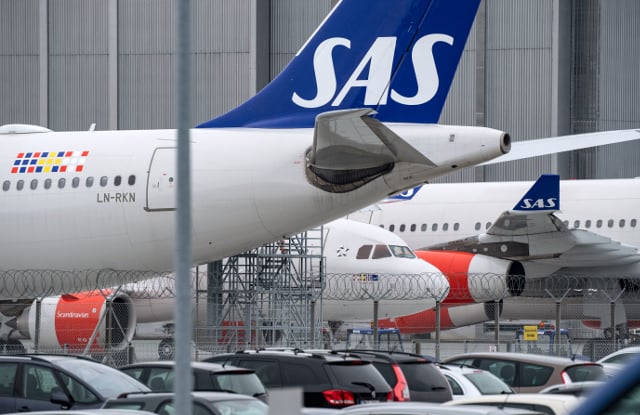- SAS cancels Wednesday flights as strike shows no sign of ending
- What you need to know if you're affected by the SAS strike
- ANALYSIS: Why is the SAS strike happening now?
SAS
SAS starts talks with unions to end six-day strike
Scandinavian airline SAS began talks with pilot unions in Oslo on Wednesday morning, hoping to restart flights as early as 2pm on Thursday.
Published: 1 May 2019 11:21 CEST

An SAS plane: Photo: TT
“We have entered a good and constructive phase where we, with the help of the national mediator, will hopefully be able to bring an end to this tragic strike,” Knut Morten Johansen, the company's press chief in Norway, told Norwegian state broadcaster NRK.
The first meeting began at 11am at the offices of the national mediator. As Marianne Hernes, SAS's chief negotiator, entered the building she was asked if there was now a possibility of a solution. “We absolutely hope so,” she said.
It was the first time the two sides had sat down together for talks since SAS pilots walked off the job in Sweden, Denmark and Norway on Friday demanding better pay and conditions, though they met prior to the walkout.
“We will try and find a solution to the conflict. I always believe there is a solution, but it's a challenge,” Mats Wilhelm Ruland, Norway's national mediator, told Norway's NTB news wire.
Shortly after the talks began, SAS announced that it would cancel a further 280 flights on Thursday morning and early afternoon, affecting a further 20,000 passengers.
But Johansen said that he hoped these cancellations would be the last. “If we reach an agreement, we'll do everything we can to deliver the existing schedule after 2pm,” he told NRK.
Jan Sjölin, his counterpart at the Swedish National Mediation Office, said that the talks in Norway would cover pilots in Sweden and Denmark as well.
READ ALSO:
“Everything in this applies to Sweden, Denmark and Norway. The employer is the same in all the countries, and the pilots' negotiating organisation is as well,” he told Sweden's TT newswire. “We are waiting for the signals from Oslo.”
Freja Annamatz, SAS's press chief, confirmed that although the negotiations were taking place in Oslo for “efficiency reasons”, separate talks would take place in Oslo over collective bargaining agreements for each of the three countries.
“It's encouraging that the two sides are meeting at the Norwegian national mediator,” she told TT. Mariam Skovfoged, the company's press chief in Denmark, told the Danish news agency Ritzau that the talks would also cover Danish pilots.
Both SAS and union negotiators have signed a confidentiality clause preventing them from disclosing details of the talks to the media during the duration of the mediation.
The Swedish Air Line Pilots Association, which initiated the strike, has said that months of previous talks had failed to result in a solution to pilots' “deteriorating work conditions, unpredictable work schedules and job insecurity”.
As well as higher pay, pilots have been asking for a more predictable work schedule where they are informed of their hours at least two weeks before the monthly rota comes into force. Pilots complain they have to work variable hours and sometimes work several weekends in a row.
After almost going bankrupt in 2012, SAS has implemented repeated savings programmes in recent years to improve its profitability.
Since the strike started last Friday, over 3,306 flights have been cancelled, affecting 300,000 passengers. A further 504 flights have been cancelled on May 1, affecting a further 47,583 passengers.
Url copied to clipboard!


 Please whitelist us to continue reading.
Please whitelist us to continue reading.
Member comments